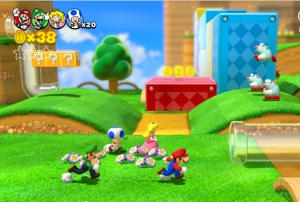It’s time for another post looking at a common pitfall of game development. Today’s post is one of the more innocuous traps that can befall a game and game designers, and in many cases is not even a problem and that is listening to your fans.
Fandom:
Any game developer can tell you of the importance of feedback from your fan base. Being able to get a lot of eyes on your game to figure out what works, what doesn’t and if your game is good, is vital in today’s market. Developers like Introversion Software and Klei Entertainment have made extensive use of their fans to help tweak their games and to spot any annoying bugs before their respective releases.

Companies like Nintendo design their games for a variety of skill levels and audiences, which helps with their accessibility
Early Access has been a godsend for letting gamers try out titles before release and getting the as mentioned feedback for the developers. At this point, I’m sure you’re wondering what the problem is with feedback from your fans, considering its important uses.
The problem with listening to your fans is when you only hear their voices and no one else’s when developing your title.
Tunnel Listening:
Fan Tunnel Vision is a simple term I use when developers completely close themselves off from outside criticism and only focus on their fan base. The reason is that the developers obviously trust their fans and feel that their voice is more important compared to someone just new figuring out their game.
The problem is that your fans provide you with feedback from an expert perspective, but that doesn’t help you when it comes to growing your audience. We see this typically in either strategy games or competitive titles; where the developer tends to focus on feedback from the hardcore following. What ends up happening is that the game becomes very hard for new players to break in, because there were no allowances for anyone other than the hardcore.
Planetary Annihilation which I talked about again recently is a good example of this. When the game was “released” out of Early Access, it had nothing to help someone new figure out how the game works; no tutorials, a busted single player and an AI that didn’t know how to use advanced units. The reason is that the developers were again listening to their most hardcore fans: The ones who played from early Alpha and mastered all the game’s nuances; so why would they need expanded tutorials and UI? The answer is they didn’t, and the new players were left out in the cold.
Before anyone comments on the importance of viewing let’s plays, I have to once again point out that any game that requires outside sources of information to learn is an example of a poorly designed title.

Klei Entertainment goes into Early Access with an established game foundation, and then the fans help to fine tune things
Another point is only listening to your hardcore fans when it comes to balance changes. In competitive games you need to be really careful with how you fine tune your content; tweaking things too far for the hardcore side may end up making your game less appealing overall.
The problem is that reducing your game to min/maxing will limit replayability. When there is only one “correct” way to win, it will punish people who try to do something else.
We’ve seen two examples of this with Evolve and Hearthstone. Evolve has had nothing but trouble with expanding the fan base due to balance changes aimed at the hardcore players and keeping them happy. With Hearthstone, Blizzard has been fighting a constant battle to keep the game from becoming stale, as expert players are figuring out the best decks and then posting them for everyone to use.
Taking Charge:
Listening to your fans and getting feedback is important, but at the end of the day the game designer is the one in charge. Despite what fans will say (or scream), Early Access and game development is not a democracy, it’s a dictatorship. A good game developer will listen to their fans, but ultimately it’s up to them to decide where to take their game.
Again this goes back to importance of figuring out the foundation for your title and having that as the base for the rest of your game. Sometimes you will have to make a decision that is for the game and vision you want to make, that will annoy your fans. Being successful in the Game Industry is about reaching as many people as possible, not making a game for you and a small group of friends. It’s important to have as many eyes on your game as possible, which includes newcomers as well as your fans. As I said in my post on Planetary Annihilation, there is a reason why companies like Nintendo and Blizzard are still the heavy hitters in the industry, because they can create games for a vast majority of people and skill levels.
It takes a skilled game developer to make a game appealing and interesting to multiple skill groups and not everyone has that talent. There are many developers out there who stick to a niche and can’t or won’t develop things further. And while it’s not the end of the world sticking to a niche, the difference in terms of success can be immense and what separates a good game developer from an amazing one.


